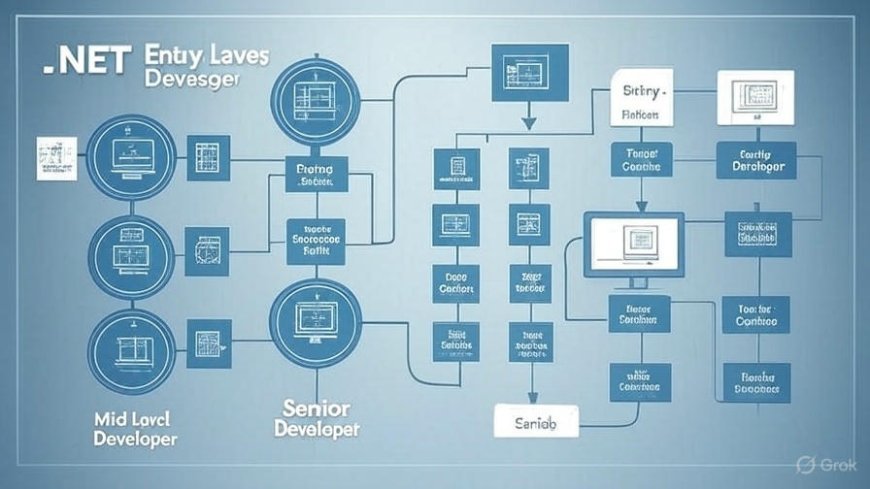.NET Developer Career Path: What You Need to Know to Succeed in 2025

.NET Developer Career Path: What You Need to Know to Succeed in 2025
Embarking on a .NET developer career path in 2025 offers a landscape rich with opportunities and challenges. As technology evolves, so does the demand for skilled .NET developers who can navigate the complexities of modern software development. This guide will provide you with essential insights and strategies to succeed in this dynamic field.
Preparing for interviews is a crucial step in your journey. Familiarize yourself with common dot net interview questions to build confidence and enhance your problem-solving skills. This preparation will not only help you secure a job but also deepen your understanding of .NET technologies.
Understanding the .NET Ecosystem
The .NET ecosystem is vast and continually expanding. At its core, .NET is a free, cross-platform, open-source developer platform for building many different types of applications. Whether you're interested in web development, mobile apps, desktop applications, or cloud services, .NET provides the tools and frameworks to bring your ideas to life.
Key Components of .NET
.NET Framework: The original .NET Framework is a Windows-only platform for building applications. While it remains widely used, newer cross-platform alternatives are gaining traction.
.NET Core: A cross-platform, high-performance, open-source framework for building modern, cloud-based, and internet-connected applications. .NET Core has merged with the .NET Framework to form .NET 5 and later versions.
Xamarin: A tool for building native mobile applications using .NET and C#. Xamarin allows developers to share code across iOS, Android, and Windows platforms.
ASP.NET Core: A modern web framework for building web applications and services that run on Windows, Linux, and macOS. ASP.NET Core is known for its performance, flexibility, and ease of use.
Essential Skills for .NET Developers
To thrive in a .NET developer career path, you need a diverse set of skills that go beyond just coding. Here are some essential skills to focus on:
Technical Skills
Proficiency in C#: C# is the primary programming language used in .NET development. A strong understanding of C# syntax, features, and best practices is crucial.
Knowledge of .NET Frameworks: Familiarity with various .NET frameworks, such as ASP.NET Core, Entity Framework, and Xamarin, is essential for building different types of applications.
Database Management: Understanding how to work with databases, including SQL Server, PostgreSQL, and NoSQL databases, is vital for developing robust applications.
Front-End Technologies: Knowledge of front-end technologies like HTML, CSS, JavaScript, and popular frameworks like Angular, React, or Vue.js can enhance your ability to build full-stack applications.
Soft Skills
Problem-Solving: The ability to analyze complex problems and develop effective solutions is a critical skill for any developer.
Communication: Strong communication skills are essential for collaborating with team members, stakeholders, and clients.
Adaptability: The tech industry is constantly evolving. Being adaptable and open to learning new technologies and methodologies is crucial for long-term success.
Educational Pathways
There are several educational pathways you can take to prepare for a .NET developer career path. Whether you prefer formal education or self-paced learning, there are options to suit your needs.
Formal Education
Computer Science Degree: Pursuing a degree in computer science or a related field provides a solid foundation in programming, algorithms, data structures, and software engineering principles.
Bootcamps: Coding bootcamps offer intensive, short-term training programs that focus on practical skills and real-world projects. Many bootcamps specialize in .NET development and can help you quickly gain the skills needed to enter the job market.
Self-Paced Learning
Online Courses: Platforms like Udemy, Coursera, and Pluralsight offer a wide range of courses on .NET development. These courses often include video lectures, hands-on exercises, and projects to help you apply what you've learned.
Documentation and Tutorials: Microsoft's official documentation and tutorials are excellent resources for learning .NET. They provide in-depth information on various .NET technologies and best practices.
Open-Source Projects: Contributing to open-source projects on platforms like GitHub can help you gain practical experience, build a portfolio, and connect with other developers.
Building a Strong Portfolio
A strong portfolio is essential for showcasing your skills and experience to potential employers. Here are some tips for building an impressive portfolio:
Personal Projects
Develop personal projects that demonstrate your ability to build functional and innovative applications. These projects can range from simple web applications to complex full-stack solutions.
Contributions to Open-Source Projects
Contributing to open-source projects not only helps you gain experience but also shows potential employers that you are proactive and engaged in the developer community.
Internships and Freelance Work
Internships and freelance work provide valuable real-world experience and the opportunity to work on diverse projects. They also allow you to build professional relationships and gain references for future job applications.
Networking and Professional Development
Networking and continuous professional development are crucial for advancing your .NET developer career path. Here are some strategies to help you stay connected and up-to-date:
Join Developer Communities
Participate in online forums, social media groups, and local meetups to connect with other developers. Platforms like Stack Overflow, Reddit, and LinkedIn are great places to ask questions, share knowledge, and build relationships.
Attend Conferences and Workshops
Attending industry conferences and workshops provides opportunities to learn from experts, discover new technologies, and network with professionals in the field.
Continuous Learning
Stay updated with the latest trends and advancements in .NET development by reading blogs, following industry leaders, and taking advanced courses. Continuous learning ensures that your skills remain relevant and competitive.
Job Market and Career Opportunities
The job market for .NET developers is robust, with a high demand for skilled professionals across various industries. Here are some career opportunities to consider:
Software Developer
Software developers design, build, and maintain software applications. They work on various aspects of the development process, from writing code to testing and debugging.
Web Developer
Web developers specialize in building web applications and services. They use technologies like ASP.NET Core, HTML, CSS, and JavaScript to create responsive and user-friendly websites.
Mobile Developer
Mobile developers focus on building applications for mobile devices. With Xamarin, .NET developers can create cross-platform mobile apps that run on iOS, Android, and Windows.
Cloud Developer
Cloud developers design and implement cloud-based solutions using platforms like Microsoft Azure. They work on scalable and secure applications that leverage cloud services.
DevOps Engineer
DevOps engineers bridge the gap between development and operations. They focus on continuous integration, continuous delivery (CI/CD), and automating the software development lifecycle.
Future Trends in .NET Development
Staying ahead of future trends is essential for long-term success in your .NET developer career path. Here are some trends to watch in 2025 and beyond:
Artificial Intelligence and Machine Learning
Integrating AI and machine learning into .NET applications is becoming increasingly popular. Familiarity with AI and ML frameworks, such as ML.NET, can open up new career opportunities.
Internet of Things (IoT)
The IoT market is growing rapidly, and .NET developers can play a crucial role in building IoT solutions. Understanding how to work with IoT devices and platforms is a valuable skill.
Microservices Architecture
Microservices architecture is gaining traction as a way to build scalable and maintainable applications. Learning how to design and implement microservices using .NET can enhance your career prospects.
Serverless Computing
Serverless computing allows developers to build and run applications without managing infrastructure. Familiarity with serverless platforms, such as Azure Functions, can be beneficial for modern application development.
Conclusion
Embarking on a .NET developer career path in 2025 offers a world of opportunities for those willing to invest in their skills and stay adaptable. By understanding the .NET ecosystem, acquiring essential technical and soft skills, pursuing relevant education, building a strong portfolio, networking, and staying updated with industry trends, you can position yourself for success in this dynamic field. Whether you're just starting or looking to advance your career, the key to thriving as a .NET developer lies in continuous learning and a passion for innovation.
What's Your Reaction?































































